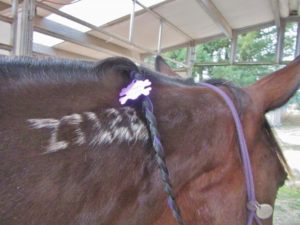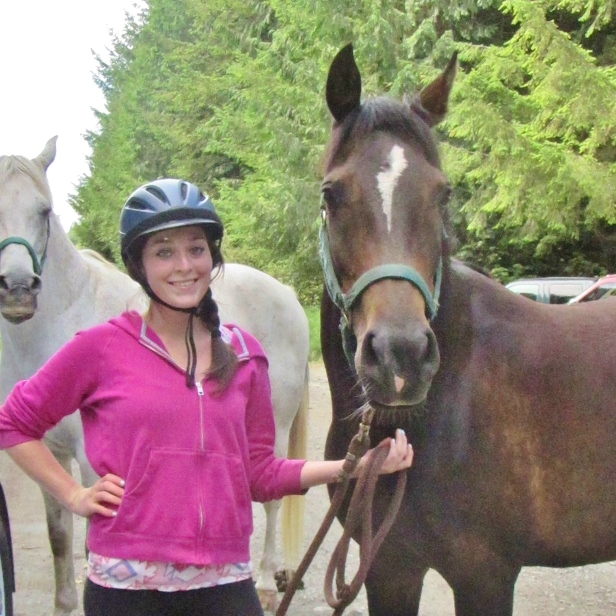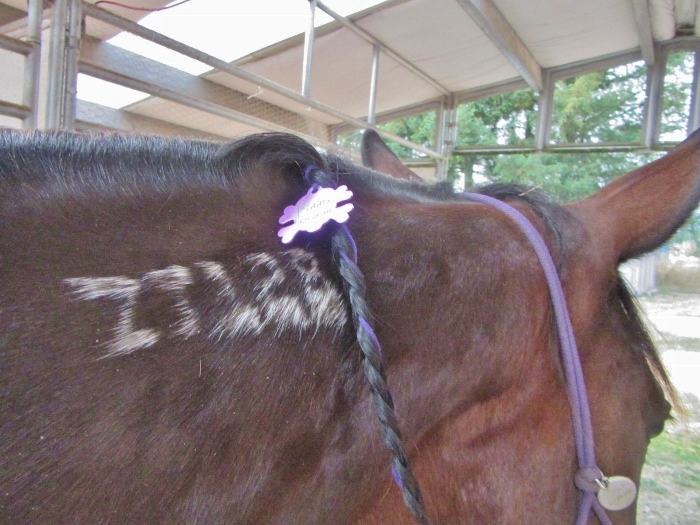6 Keys to Retrieving a Wayward Equine
by Aarene Storms
While it may sound improbable, lost horses are not uncommon. Years ago, a horse I took to an endurance ride in Prineville Oregon got scared in the middle of the night, blew through his electric pen and ran off into the hills. Several of us walked for miles on foot all night, shouting his name and trying not to despair. Cowboys on quads found the horse four days later and led him out safely. More recently, a young, green horse named Normandy spooked near the trailhead, dumped his rider and scampered off into the woods of lowland Washington State. Katie Glowaski says she stayed in the woods to hunt for the missing horse and sent her younger daughter to the hospital to get stitched up after hitting the ground. I hope you never lose a horse as Katie and I did, but if you do here are some tips that may speed the recovery.

Be able to identify your horse. This includes his color, age, breed, markings and tack.Within hours of Normandy’s sudden exodus, photos of him posted by Glowaski’s other daughter popped up on local Facebook feeds. By late afternoon, equestrians, mountain bikers and hikers arrived at the trailhead to help search for the missing gelding. If your horse is nondescript add some kind of identification when you leave home with it. I braid a tag engraved with my cell phone number into my horse’s mane and attach similar tags to my bridle and saddle.
Consider having your horse branded, freezemarked, or microchipped. My current horse is a plain brown mare with a very distinguishing mark: a freeze brand showing her USTA registration number. Microchipping is common and inexpensive. If you microchip your horse, keep your contact information current on the data site—you don’t want people trying to call the number of a phone you dropped in the lake two summers ago!
I take photos of my horse every summer and winter so I have recent pictures showing her conformation and markings with a season appropriate hair coat. I hope I never have to put these photos on a “LOST HORSE” poster, but if I need them, I’ve got them. I also have a lifetime livestock brand inspection ID card issued by the state and stored in a secure location in the horse trailer.
Ask for help. Who will you call if your horse is lost? Here’s an idea—everyone nearby!This includes equestrians and bike riders, dog walkers and kids. If you’re on private land call the landowners. If you’re near private land, call the neighbors. The Backcountry Horsemen are also an excellent resource. They know the local trails and some are probably also members of search and rescue, or will know how to contact S&R. Law enforcement should also be on your list and if you’re near a state road or highway call the state police. If you’re in a park, call the rangers. Animal control and local auction yards are other resources. Some areas have multiple animal control agencies and you want to talk to them all. If somebody finds your horse and wants to sell him because they haven’t seen your posters, you will want the auction staff watching for your horse so he doesn’t get sold to a kill buyer. Lastly, construction crews, loggers, road and trail crews should be questioned, if any are working nearby.
Use technology. NetPosse.com operates a nationwide alert system for lost and stolen horses. If the horse is in an open area, consider enlisting a local airplane or helicopter or drone pilot in the search. Activate your social media network. Post notices on Facebook, Nextdoor and “lost animal” lists. Be sure to include photos of the horse, the date he was lost, the specific location and your cell phone number. Update social media posts frequently.
Keep the search organized. Use brightly colored surveyor’s ribbon, notes stapled to trees, or strips of cloth tied to branches to mark areas already searched.
“Our night riders put ribbon on their own horses’ manure, so that daytime searchers knew that the fresh manure wasn’t from the lost horse,” says Glowaski. She also recommends assigning two people to answer questions and coordinate information online. “I received more than 100 text messages while searching, and couldn’t keep up with them all.”
Enlist kids. Kids and teens will keep looking long after adults have lost hope and interest.
Make a poster. Make up a simple “Lost Horse” poster with this information: breed, gender, color + markings, description of tack, date the horse was lost, last known location. Don’t forget a photo and contact info (tear-away strips are good). Make a billion copies of the poster and put it everywhere: gas stations, feed stores, gear shops, grocery stores and the local newspaper. Send information via email. Re-print with updated information as often as necessary.
Horses can cover a lot of territory and they move faster than human search crews. Consider where your horse will go and/or lure him to you. Here are some tips on equine behavior:
- Horses usually head downhill and stay near food, water, or other horses. If your horse loves to run, avoids the company of strange horses, is afraid of swinging ropes or has any other personality quirks, keep those things in mind.
- If your horse responds to a specific whistle or name, share that with searchers. YouTube is a good tool here. When searchers finally saw Normandy, they called his name and he came to it!
- If your horse is food motivated, take a “shaker” can with you— a can with grain in it, or something that sounds like a grain can.
- Take the horse’s best buddy with you when you search. With luck, the buddy horse will holler and your horse will come running.
Many lost horses are found and usually within a few days. Sometimes lost horses are gone for a month or more. Keep looking. It’s hard, I know, but keep looking.
Published in November 2015 Issue

Aarene Storms returned to horses as an adult after wasting her teen years becoming educated and employed. In 1999 she rode her first long-distance event and has been active in the endurance community ever since. The author of Endurance 101,Aarene has also written numerous articles for Endurance News and other equestrian publications. Visit her at haikufarm.blogspot.com.







Thanks for sharing your story and the useful tips.
I was wondering if there is a good gps or other types of tracker for horses that is reliable?
Hey, thanks for commenting! I would suggest you reach out to Robert Eversole at Trailmeister.com. He’s be happy to answer your question. I’m sure he’s tried them all!